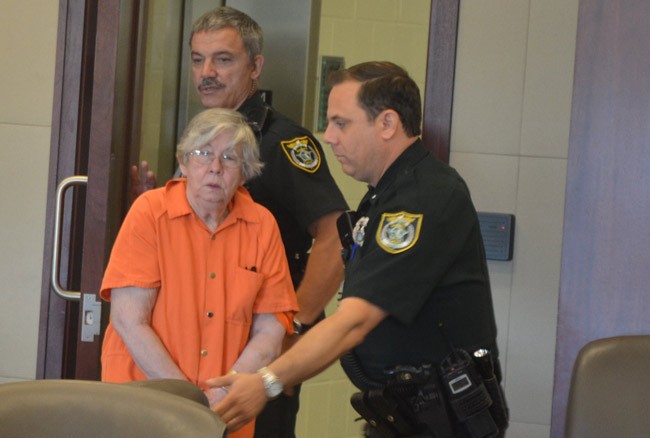
(© FlaglerLive)
On Sept. 23, Anna Pehota, then 75, called 911 and said she shot and killed her husband John at the couple’s Hammock trailer at 132 Sanchez Avenue. In the hours, days and weeks following the shooting, she became the prosecution’s best witness against herself, proffering confessions, resisting her own defense attorney and seeking to be done with the matter as son as possible.
With the appointment of Ray Warren, a skilled and aggressive attorney, as her public defender, she eventually changed her mind. She wants to go to trial on her second-degree murder charge, preferring–as she told Circuit Judge Matthew Foxman in court this morning–to take her chances rather than consider a plea deal that would result in a possible sentence of 15 to 30 years. “The life length of a woman is 80 and a half years old, I’m 76 years old,” she said. “Four years and I’ll be 80. So when you talk about manslaughter compared to second-degree murder, 30 years to 20 years, there’s no difference to me. I’d rather take my chances.”
While Pehota’s retreat from her confessions finally made Warren’s job easier, he has had to clean up the legal wreckage she created for her case after the shooting. Part of that wreckage is what the prosecution takes as her confession to cops, particularly in a long interview with Flagler County Sheriff’s detective Jorge Fuentes.
Warren was seeking to have that confession suppressed. The confession is central to the prosecution’s case against Pehota, of course: as evidence, it doesn’t get much more damning than if she’d been videotaped holding the smoking gun. With it, it would be difficult for her to convince a jury (or a judge, in a non-jury trial, which is still possible) that she did not commit murder. Without it, the defense can possibly adopt the sort of strategy that plays up Pehota’s desperation at the time of the shooting–a desperation to which some of the Pehotas’ intimates attested in letters to the court–and maybe mitigate her punishment. But judge or jury could still find that a second-degree murder took place, and she could still be sentenced to what would, for her, amount to a life term.
Today, Circuit Judge Matthew Foxman handed Pehota and Warren another setback when he ruled against the motion to suppress the confession. Her trial is now likely to take place the week of April 18.
Warren had one avenue to exclude the confession: convincing the judge that the confession was the result of what’s legally considered a poisoned tree. That is, she made the confessions without having been provided her Miranda rights fully and properly. None of the cops who’d interacted with her after the shooting had given her her rights until a detective interviewed her. That detective this morning–Jorge Fuentes–in testimony said he repeatedly tried to give her the full rights (which consist of five parts), but that she cut him off repeatedly, and spoke at length herself.
Absent those rights, anything she’d have said would have to be suppressed under the exclusionary rule.

In this case, Warren said, it’s not whether the interrogator believes he gave Pehota her Miranda rights. It’s whether Pehota understood her rights. Warren contends she did not–just as she did not understand that a public defender could be appointed to defend her, at no cost to her (as cost was central to her initial rejection of an attorney.) So whether the detective thought he was complying with Miranda is irrelevant: it’s whether Pehota was in fact provided—and perceived she was provided—her rights. in sum, Warren contended, she did not understand the five warnings of Miranda.
An attempt to suppress a confession fails, complicating the defense ahead.
“What would you have had him do differently?” Foxman asked Warren.
Fuentes should have gone back into the interview and clarified the Miranda matter with Pehota further, explicitly, Warren said. “My argument is she never understood her right to counsel, so we never get to the second step, whether she unequivocally requested counsel,” Warren said.
It’s a straight-forward argument, but one not often made in these circumstances, when many overworked, will not bother battling over the details of a suspect’s constitutional rights because from all appearances, the suspect seems to be confessing of her own free will. By definition, Miranda warnings compel the state to clearly and unequivocally explain to a suspect what his or her rights are, in spite of the suspect being argumentative or opinionated. “He should have done a better job explaining to her” what her rights are, Warren said of Fuentes. It was not up to Pehota to prove her understanding, but up to Fuentes to elicit that proof, unequivocally.
Chris Miller, the assistant state attorney, said Pehota’s responses during her interrogation with Fuentes had clearly waived her rights, intelligently and coherently. Miller quipped that if there’d been coercion during the interview, it was Pehota’s constant interruptions not letting Fuentes get his words in. “Th tone and tenor” of her interview indicated that Pehota wanted to talk about what had taken place, Miller said. “There was no interrogation, and there was no unequivocal demand for counsel.”
Ruling in favor of the prosecution at the end of the 75-minute hearing, Foxman said he did not find any coercion in the sense that there were any “intimidation or threats or anything against Ms. Pehota’s will, and I do find this to be voluntary, knowing and intelligently entered waiver of her Miranda rights. She was read them, and then had follow-up questions as to whether or not she understood her rights.” He added: “She essentially is initiating at that point even after she’s being read her Miranda rights in being asked whether she understood those rights. To require more of what detective Fuentes did would be to say you couldn’t have an interview at all. So I think he did everything that the law required him to do.”
That left the defense and the prosecution to decide when the case would move ahead to trial. That doesn’t mean a plea deal is off the table: such a deal could still be possible before the mid-April trial date.
Pehota, shackled hand and feet and in her orange jail jump suit, had listened to the arguments intently–as had, incidentally, three, then four, bailiffs, sheriff’s deputies all who showed more interest than they usually do in the arguments and their outcome, as the judge’s decision would go to the heart of a deputy’s discretion during an interrogation.
At the end of the hearing, Pehota told the judge that she had no recollection whatsoever of the four-hour interrogation with Fuentes, a detail that may prove useful in her subsequent defense.
Early in the hearing Foxman, as is his wont with suspects before him, asked Pehota how she was.
“I just want to know when I can go home,” she said.
The judge asked her if she was being treated well.
“You really don’t want me to get started on jail life,” she said.
“No, but are you doing OK?”
“Yes, I’m doing fine.”





























Geezer says
It’s strange to see an elderly lady (who’s pushing 80) led out in handcuffs.
I know that it’s standard procedure–but I find it remarkable just the same.
Maybe granny is trained in the martial arts…..
Anonymous says
This woman obviously needs a competency and psychiatric evaluation…quickly! She should also be placed on “suicide watch” until she gets one, whether she is currently (and overtly) making threats of self-harm or not.
YankeeExPat says
Hey Baby this is Florida, I would assume that the Death Penalty should the first consideration on the list.
As the Bible Thumpers like to extol, “An Eye for an Eye”
Concerned says
@Flaglerlive, please supply any basis in fact for your statement that many public defenders do not challenge whether a confession was made voluntarily. Moreover, please describe why you chose to categorize as “public defenders” as opposed to “defense attorneys.” This would be like me saying: It seems many Flagler Live writers are willing to state assumptions as facts that other, you know, journalists would not.
FlaglerLive says
While a few links and a clarifying clause were certainly necessary–and have been added–to back up the obvious, your suggestion that public defenders in the main are actually capable to live up to their responsibilities, given the constraints, is absurd, when upwards of 90 percent of their charges plead out and their offices are granted a fraction of prosecutors’ budgets. They’re set up to fail. As for the distinction between public defender and defense attorney, we think it’s worth pointing out the difference between a court-appointed attorney for the indigent and a private-pay attorney. But if you’d like to make the case that public defenders are equally able to defend their clients as private-pay attorneys are, as if the two were the same, and that public defenders’ offices are as equally funded as prosecutors’ offices, by all means, let’s examine those assumptions.
Michael says
This is not the same lady before and/or shortly after the murder. With all the time that has past and with the system taking care of her, eliminating the stress of her day to day living conditions, she now appears to be rational and I don’t think she was at the time. The court system is not prepared nor understand the stress that caretakers are under.